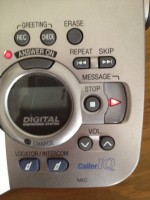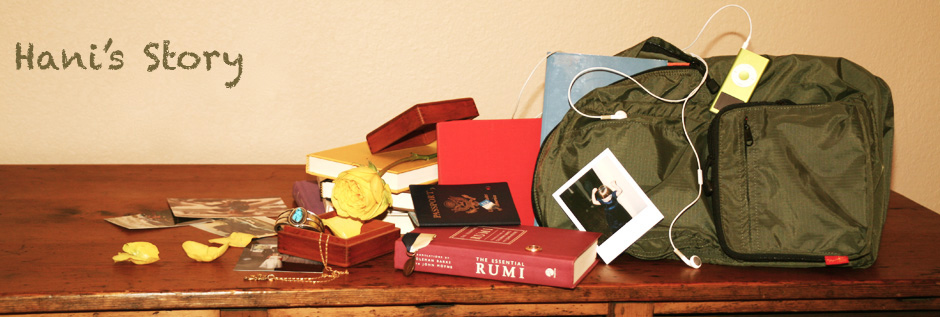Prefer to listen? Click here:
 My life was absolutely perfect. Except that three months after we moved to Washington, Bob was diagnosed with acute myeloid leukemia.
My life was absolutely perfect. Except that three months after we moved to Washington, Bob was diagnosed with acute myeloid leukemia.
In another development that felt, cosmically and karmically, really, truly unfair, a few months after that, coming in from yet another doctor’s appointment one afternoon, there was the light flashing on the answering machine. A voice I didn’t recognize, with a thick Georgia drawl: “I hope I’ve reached Leila’s daughter, Hanalie? This is her friend, her neighbor, Betty Rondell? Your mama’s having some problems, honey. Would you mind givin’ me a call?”
I really didn’t want to dial that number, but I did, after making sure Bob was settled with his meds and his ever-present laptop. I poured myself a glass of wine, bracing myself for more bad news. Weird how all the bad news about Bob was hard, but it just made me love him more. When it came to Mom, loving her had always been a job she made as difficult as possible.
Betty Rondell herself answered. “Oh, honey,” she said, in that way southern women have, talking as if they’re perpetually comforting the recently bereaved, “I’m just so glad you called. Your mama is not well, you know? She’s been doin’ some kind of nutty things lately. Did you know she wrecked her car last week? I don’t know why she hasn’t done something about it, she’s gotta have insurance, right? But today, I picked her up, she was walkin’ down the block. She’d been to the Walgreens, but she walked right past her own house, like she didn’t even know where she lived. Once I got her home, she was okay again, you know, thanked me for helpin’ her and all, but I think you better get down here real quick. Somethin’s just not right.”
Bob was great. Go see about your mom, he insisted. His own parents had died when he was fifteen. The grandmother who’d taken him in after that was gone, too. If anything, he was more attached to my mother than I was.
So I went to Atlanta. Went and hired temporary help, and came back to take Bob to his next round of appointments. Mom kept firing the help. I went back to Atlanta, when I couldn’t sort things out over the phone. After the fourth trip, when I came back so exhausted I didn’t even make it to the bedroom, but fell asleep on the living room couch, my still-packed bags sitting next to me, I knew it was time for more drastic measures. I consulted lawyers and began plowing through the paperwork to be able to make what decisions had to be made on her behalf. I lined up the movers in Atlanta, and called a realtor. Like it or not, Mom would have to come to Washington. I researched the best facility available in the city, the best care, and found it was only 20 minutes from our condo.
Of course, the medical center, our new home away from home, was 40 minutes in the opposite direction.
Bob had a respite, a three-week window between treatments, and a period when he felt halfway human again. Even though I was trying hard not to worry about him, I was glad he was along, when we made the tense drive from Atlanta back to D.C., Mom repeating the same suspicious questions about where we were going, and why, every few minutes, all the way, protesting the miles away.
We’d finally dumped his old junker of a Volvo, and sprung for a small SUV. Bob was too weak to drive, but he was relentlessly upbeat, in his jeans and sweatshirt and what he called his chemo cap, all that beautiful hair gone. I could only imagine what it cost him, that forced cheeriness. I’d seen him in pretty hellish shape not so long before, on his knees, puking his guts out, startling me with his unaccustomed cursing. The profanity was usually my department.
But on the long hypnotic drive back north, while I piloted us, up Interstate 75, to 85, to 95, eyes straight ahead, ears cocked for the slightest sounds of distress from my passengers, Bob was the one who answered her questions every time, with infinite patience, and even good humor.
For me, gripping the steering wheel until my hands cramped, it felt like an unending exercise in fighting my rampaging fears, invoking that inner Source over and over and over again in silent, desperate efforts just to maintain some semblance of tranquility. There were moments I could only credit the Divine with making the critical exits and lane changes; even those big green interstate signs are hard to see when you’re blinking back tears behind your shades.
I won’t say it was a constant struggle, although it mostly was. There were moments – fleeting but wondrous – when some ray of the Divine broke through, moments when I found myself flowing on a wave of some amazing energy that impossibly encompassed all the joy and sorrow in my life, moments when I found myself smiling for no good reason, as I drove my dementia-addled mother and my precious dying husband up those long, long interstate miles, headed north, headed home, to where I could watch them both slip away from me.
